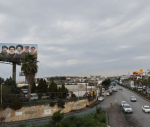You are here
Why the US continues to fail in the Arab world
Mar 04,2024 - Last updated at Mar 04,2024
One week before the October 7th Hamas surprise attack in Israel, President Biden’s national security adviser was quoted saying:
“The war in Yemen is in its 19th month of truce, for now the Iranian attacks against US forces have stopped, our presence in Iraq is stable, I emphasise for now because all of that can change. The Middle East region is quieter today than it has been in two decades. Now challenges remain… but the amount of time that I have to spend on crisis and conflict in the Middle East today compared to any of my predecessors going back to 9/11 is significantly reduced.”
Four-and-a-half months later: Israel is pursuing a devastating genocidal war against Palestinians in Gaza; Israeli military and settlers are engaged in widespread, often uncontrolled, violence in the West Bank; Lebanon’s Hizbollah militia and Israel are locked in low-intensity but deadly and ominous cross-border shelling; Iranian-backed militias in Iraq and Syria challenge US forces in the region; and another Iranian ally, the Houthi movement in Yemen, has created havoc by attacking ships in the Red Sea. Needless to say, the White House has shifted from neglecting the Arab World to making it a full-time concern, one they neither expected, nor for which they were prepared.
Since the end of the Vietnam war, despite their best efforts, every US president has had the trajectory of their time in office shaped by conflict and repeated blunders in the Arab World. During the last half century, the US has sent more weapons, spent more money, committed more troops, lost more lives and expended more political capital in the Arab World than anywhere else, and yet, time and again, has failed. Beyond the wars, lives, treasure, prestige and trust lost, we never acknowledge these failures or are simply oblivious to them.
Candidates competing for the presidency never seriously debate US policy in the Middle East. They have never course-correct our approach toward the region, and the media rarely calls them to account for inadequate policies. We continue to fail and act surprised or oblivious to our failures, for three important reasons.
First, we do not know the region and its peoples. Too many of our policymakers see the Middle East through the lens of Israel, instead of the Arab World. We fail to recognise the centrality of Palestine to the Arab people. Since 1948, Palestine and the fate of Palestinians has been “the wound in the Arab heart that has never healed”. Time and again, policymakers either proclaim the issue dead or make efforts to sideline it, only to be stunned when Palestine erupts in violence and reasserts its centrality in Arab consciousness.
Second, we refuse to acknowledge the consequences of our self-imposed limits on how we deal with the Middle East. Because of domestic political considerations, concern for Israel is the cornerstone of too many US policy decisions. We don’t challenge or sanction Israel for its bad behaviour. To ensure its protection we insist on dominating the Israeli-Palestinian peace process, refusing to allow other partners in decision-making.
Finally, we have not recognised the disastrous impact of our failed policies on the trust needed to pursue the leadership role we insist on, as we seek to shape the region’s future.
Since the Nixon/Ford administrations a half century ago, US policymakers have been confounded by tumultuous “surprises” that should not have been surprises (e.g., the 1973 war and oil embargo, Israel’s 1982 invasion of Lebanon, the birth of Hizbollah, the Intifada, Saddam’s invasion of Kuwait, 9/11, Iraqi resistance to our invasion, an emboldened Iran, and Arab Spring). We did not understand dynamics unfolding across the region, or what Arabs were thinking about their lives, needs and aspirations for the future. These momentous events shaped the presidencies of those who tried to manage them.
The Biden administration’s failure to anticipate Hamas’ surprise attack on October 7, the unhinged Israeli genocidal assault and the Arab World’s deeply emotional response was not exceptional, but it is also not excusable. We have been down this road too many times and are still being led by policymakers who’ve failed in the past, haven’t learned and seem determined to fail again.
The writer is president of the Washington-based
Arab American Institute













Add new comment